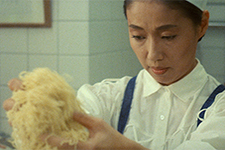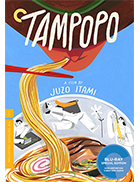Tampopo
|  Jûzô Itami’s Tampopo is an amusing, warm-hearted, delightfully quirky populist celebration of culinary pleasure. The film takes its title from one of the primary characters, but it might as well have been titled Ramen, because the uniquely Japanese dish—which consists of wheat noodles in broth, seasoned with miso, and usually topped with slices of pork and scallions—is the star of the show. Itami uses the simple dish as a vehicle for exploring both the pleasures of good food and the importance of craftsmanship in creating it. Much is made about how to both make ramen properly and how to consume it for maximum pleasure; Tampopo is a film that celebrates creation and consumption in equal measure, showing them to be flip sides of the same coin (Itami does the same with film viewing, as well, opening the movie with a bit of meta-commentary in which a white-suited gangster explains how to properly watch the movie itself). As Stanley Kauffman noted in his review back in 1987, “it deals heartily with fundamentals.” The titular character, Tampopo (Nobuko Miyamoto), is a widow who has inherited a meager noodle shop that she must maintain in order to support herself and her young son. Her ramen is adequate at best, and her business is pretty slow until the arrival of two truckers: Gorô (Tsutomu Yamazaki) and Gun (Ken Watanabe), surprising connoisseurs of ramen who are particularly adept at articulating what makes it work or not. Tampopo begs Gorô to help her improve her ramen in order to save her business, which he does by training her and teaching her how to observe the tricks of the trade from other chefs. That central narrative is interrupted in regular intervals by various vignettes that are loosely connected in terms of story, but deeply intertwined in terms of the film’s various themes relating to culinary delight and social mores. Most of these vignettes are amusing and/or deliberately strange. We get a scene in which a finishing teacher instructs a group of young women on how to eat their spaghetti without slurping, only to have them all begin slurping it deliriously when they hear another patron at the restaurant doing just that. There is a bit about a homeless man breaking into a restaurant to cook himself rice and eggs, a subversive scene in which a young man bucks the trend of his business associates by not ordering the exact same thing at a restaurant that the boss ordered, and a sex scene involving the aforementioned gangster (Kôji Yakusho), his mistress (Fukumi Kuroda), and a number of food items, including a raw egg yolk that they slide back and forth in an extended open-mouth kiss. Itami, who began as an actor before shifting behind the camera with his feature debut The Funeral (1984), which was similarly episodic in structure, strikes a unique tone in Tampopo by playing with various genre conventions to make the otherwise indelibly strange story feel vaguely familiar. Itami has described the film as “Shane with ramen” (the film’s tagline was “The First Japanese Noodle Western”), as the cowboy-hat-wearing Gorô essentially plays the role of the western hero who rides into town (literally on a big rig), saves the day by turning Tampopo’s forgettable noodle shop into a neighborhood hit, and then, his work being done, rides out of town. Itami throws in other bits as well, including a training montage right out of the Rocky series and a sense of idiosyncratic humor that would have made Luis Buñuel proud. The film doesn’t always work as a whole, especially because its random wanderings away from the central narrative make it difficult to become more than only surface involved in Tampopo’s plight, but its individual moments often come close to touching the sublime.
Copyright © 2017 James Kendrick Thoughts? E-mail James Kendrick All images copyright © The Criterion Collection | |||||||||||||||||||||||||||||||
Overall Rating: 

 (3)
(3)


